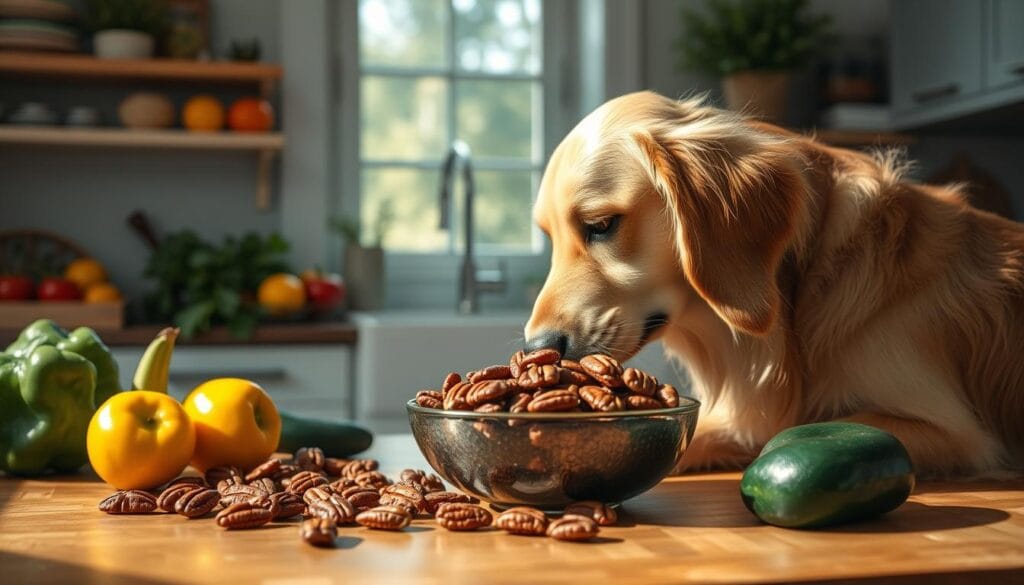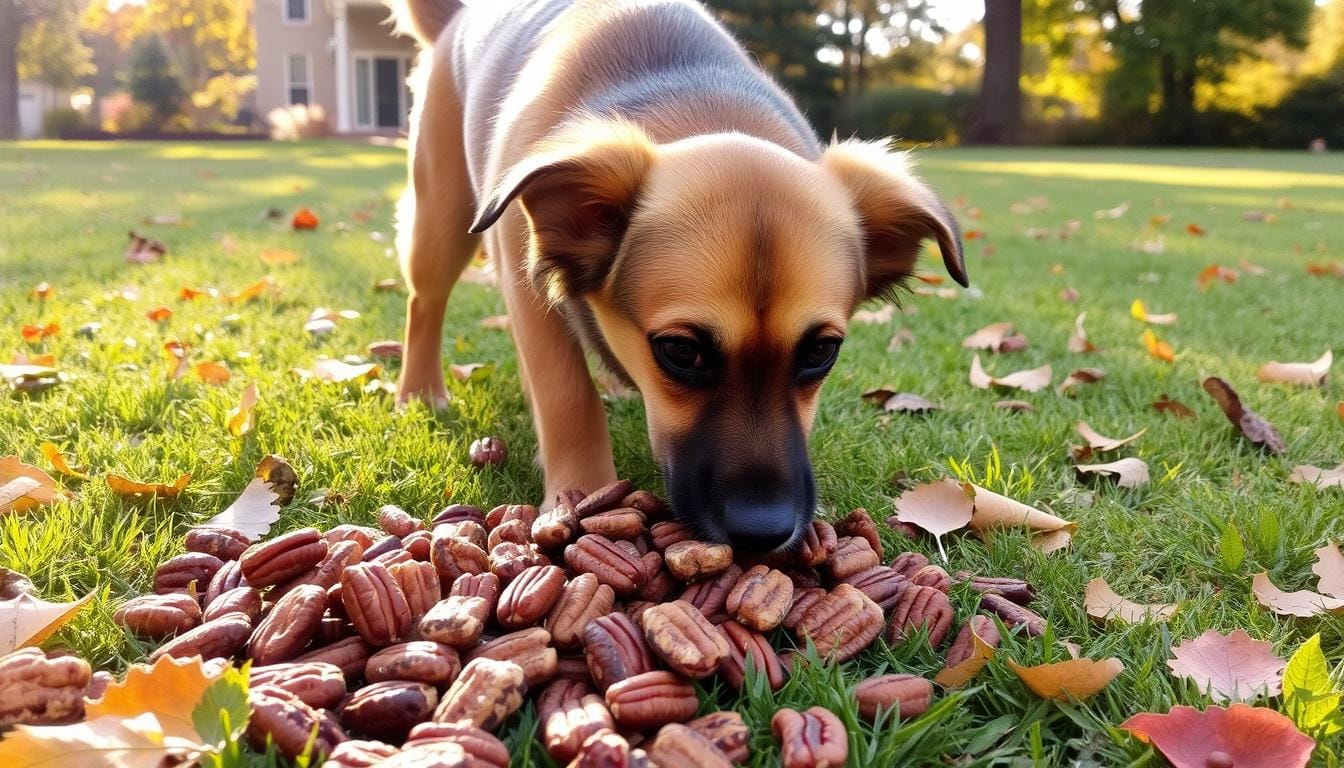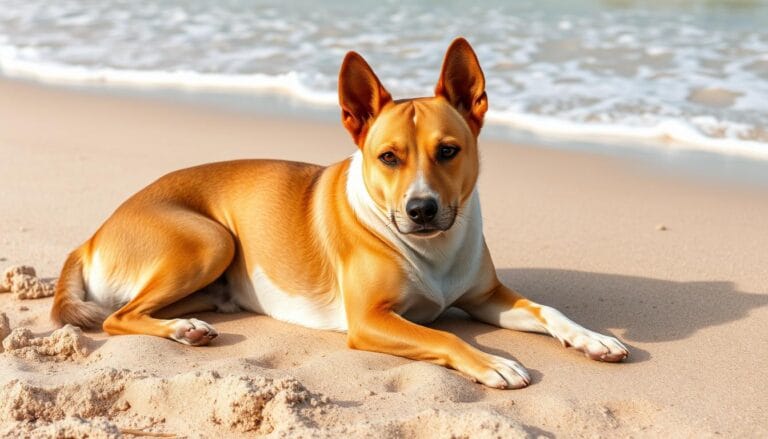Can Dogs Eat Pecans? How to Safely Treat Your Pup
As a dog owner, you might wonder if you can share pecans with your pet. But first, think about the risks. Pecans can be bad for dogs because they have a lot of fat and might be toxic. Can dogs have pecans sometimes, or should they stay away from them?
Table of Contents
With 95-98% of animal poisonings from harmful substances, it’s important to be careful with new foods. In this article, we’ll look at dogs and pecans. We’ll talk about the dangers and benefits of giving pecans to dogs. So, can dogs eat pecans safely, or should you choose other treats?
Key Takeaways
- Pecans are not a healthy snack for dogs due to their high fat content and possible toxicity.
- Can dogs eat pecans? The answer depends on several factors, like the dog’s size and how sensitive they are.
- Feeding pecans to dogs can cause stomach problems, pancreatitis, and other health issues.
- It’s best to keep pecans away from dogs and choose safer, dog-friendly treats instead.
- Seeing a vet is key if you think your dog ate pecans or seems unwell.
- Can dogs have pecans sometimes? Most experts say no, as even a little can be dangerous.
Understanding the Relationship Between Dogs and Pecans
As a dog owner, you might wonder if pecans are good for your pet. The answer depends on understanding how dogs and pecans interact. Dogs digest protein and fat well, but human foods like pecans can be hard for them. This can lead to health problems.
Dogs are naturally drawn to high-calorie foods, which can be bad if they eat too much. Pecans contain juglone, a toxic compound that can affect dogs, even in trace amounts. The fat in pecans also risks pancreatitis, causing symptoms like vomiting and pain in dogs.
Natural Dog Diet vs. Human Foods
Dogs are omnivores, meaning they can eat some plant foods. But, they might struggle with certain foods due to their digestive system. Human foods like pecans can upset their stomachs, causing vomiting and diarrhea.
Why Dogs Are Attracted to Pecans
Dogs love the calories in pecans, but eating too much can be harmful. It’s important to watch your dog and keep them away from pecans and other harmful human foods.

The Evolution of Canine Digestion
Knowing how dogs’ digestion has evolved helps you choose their diet. Dogs are meant to eat a lot of protein and fat from animals. While they can eat some plant foods, be careful with human foods like pecans. Before giving your dog pecans, ask yourself, can dog have pecans and are pecans good for dogs. The answer is not simple, and you need to think about the risks and benefits.
The Nutritional Profile of Pecans
Pecans are packed with healthy fats, protein, and fiber. But, are they good for dogs? While they offer health benefits for humans, they’re not right for dogs.
Pecans have a lot of fat, which can upset a dog’s stomach. Eating too many pecans can cause pancreatitis, a serious condition. Dogs might also get severe tremors and seizures from eating moldy pecans.
Here are some important things to know about pecans and dogs:
- Pecans are full of fiber, vitamins, protein, good fats, and antioxidants
- The high fat in pecans can upset a dog’s stomach
- Whole pecans can choke dogs and might block their digestive system
It’s important to know the risks of giving pecans to dogs. Look for safer nuts and seeds for them instead. If your dog eats pecans, watch for signs like vomiting, diarrhea, and tiredness. Call your vet right away if you see these symptoms.

Can Dogs Eat Pecans? The Simple Answer
As a dog owner, you might wonder if can dogs eat pecans. The answer is yes, but with caution. While pecans are not toxic in small amounts, too many can harm your dog’s health. It’s important to know the difference between raw and roasted pecans for your dog’s diet.
Thinking about can dogs have pecans means considering both the good and bad sides. Pecans are high in fat, which can lead to pancreatitis. But, they also have healthy fats and antioxidants that are good in small amounts.
Raw Pecans vs. Roasted Pecans
Raw and roasted pecans differ in nutrition. Raw pecans have about 691 kcal/100g, while roasted pecans have around 710 kcal/100g. Knowing this helps you choose the right pecan for your dog.
Potential Benefits and Drawbacks
Feeding pecans to dogs can offer healthy fats and antioxidants. But, there are risks like pancreatitis, stomach upset, and choking. It’s important to think about these when deciding to give pecans to your dog.
To keep your dog safe, treats like pecans should not make up more than 10% of their daily calories. Always talk to your vet before changing your dog’s diet.
Health Risks of Feeding Pecans to Dogs
As a dog owner, knowing the health risks of pecans is key. Pecans can harm dogs, mainly because of juglone, a compound in them. This can lead to digestive problems. So, it’s best to avoid giving them to your dog.
Feeding pecans to dogs can lead to choking, digestive issues, and toxicity. The ASPCA says pecans aren’t toxic, but they can cause harm. The fat in pecans can lead to pancreatitis, a serious condition. Also, the hard texture can cause choking or blockages.
Watch for symptoms like vomiting, diarrhea, and lethargy if your dog eats pecans. If you see these signs, call your vet right away. It’s safer to keep your dog away from nuts that can harm them.
In short, pecans are not good for dogs. Choose safe, healthy treats for your dog instead. Always think about your dog’s health first and talk to your vet about their diet.
Signs Your Dog Has Eaten Too Many Pecans
As a dog owner, knowing the risks of can dogs eat pecans is key. If your dog eats too many pecans, they might vomit, have diarrhea, or feel very tired. These signs can vary from mild to severe, based on how many pecans they ate and their size.
Here are some common signs to look out for:
- Vomiting
- Diarrhea
- Lethargy
- Muscle weakness
- Tremors
- Fever
- Seizures
In serious cases, eating too many pecans can cause big problems. This includes pancreatitis, intestinal blockages, or seizures. If you see any of these signs, get your dog to the vet right away. Remember, can dogs eat pecans is a serious question. Always choose caution for your dog’s health.
What to Do If Your Dog Eats Pecans
If you think your dog ate pecans, act fast to avoid health problems. Pecans have a toxic compound called juglone. So, it’s not safe for dogs to eat them.
Watch your dog closely for signs like vomiting, diarrhea, or belly pain. If you see these, call your vet right away. They might tell you to make your dog vomit or give them care to feel better.
When to Contact Your Vet
Always call your vet if your dog eats pecans. They can tell you what to do next. Sometimes, they might need to see your dog or give them special treatment.
Emergency Response Steps
Have a plan ready for emergencies. If your dog has bad symptoms like seizures or trouble breathing, call your vet or a pet poison hotline fast. They can help you and get your dog the help they need.
Safe Alternatives to Pecans for Dogs
Pecans are not good for dogs. But, there are many other safe options. If you’re wondering are pecans good for dogs, the answer is no. Instead, you can give them dog-friendly nuts and seeds like peanuts and chestnuts. Just remember, these should be given in small amounts because they are high in fat.
Healthy treats for dogs include xylitol-free peanut butter in small amounts. Carrots and green beans are also good. Always check the labels to make sure the treats are safe for your dog. You can also talk to your vet for more healthy treat ideas.
When introducing new foods or treats, do it slowly and in small amounts. This helps avoid any upset stomach. By choosing safe and healthy alternatives to pecans, you can keep your dog happy and healthy.
The Difference Between Pecans and Other Nuts
When thinking about can dogs eat walnuts and pecans, it’s key to know pecans aren’t the only nuts that can harm dogs. Walnuts and macadamia nuts can also be risky. Pecans have juglone, which is bad for dogs. Walnuts might have mold that causes seizures and tremors in dogs.
Some nuts, like cashews and peanuts, are usually okay for dogs but are very fatty. Nuts like pistachios and almonds can be choking hazards because of their shape. It’s important to remember that coatings on nuts, like cocoa or garlic, can be dangerous for dogs.
To keep your dog safe, it’s best to avoid nuts. If you do give nuts, make sure they’re plain and in small amounts. Watch for signs of nut poisoning, like vomiting, diarrhea, and seizures. Treats should not make up more than 10% of your dog’s daily food to avoid obesity.
Here are some important things to remember about nuts and dogs: * Pecans and walnuts can be toxic to dogs because of juglone and aflatoxin. * Cashews and peanuts are usually safe but are very fatty. * Pistachios and almonds can be choking hazards. * Coatings on nuts can be harmful or toxic to dogs. Knowing these risks and taking steps to avoid them can help keep your dog safe and healthy.
Proper Storage of Pecans to Protect Your Dog
As a dog owner, it’s key to think about the dangers of can dogs have pecans. Keeping nuts like pecans out of your dog’s reach is important. This helps avoid accidents and keeps your pet safe.
For safe storage, use airtight containers or zip-top bags. This stops moisture and mold, which can harm your dog. Store pecans in a cool, dry spot, like a pantry or cupboard.
Safe Storage Solutions
Here are some ways to safely store pecans:
- Use airtight containers with tight lids
- Store them in a cool, dry place
- Keep them away from your dog
By following these tips, you can keep your dog safe from can dogs have pecans dangers. This ensures a healthy and safe home for your pet.
Preventing Accidental Consumption
To stop your dog from eating pecans by accident, watch them closely. Be careful when eating or storing pecans. Clean up any spills or crumbs right away.
Training Your Dog to Avoid Pecans
As a dog owner, it’s vital to teach your dog to stay away from pecans. This is because eating them can harm your dog’s health. While a single pecan might not hurt, eating them often can cause serious problems. Start by keeping pecans out of your dog’s reach and reward them for ignoring them.
Here are some tips to help you train your dog:
- Keep pecans in a secure location to avoid accidental consumption.
- Use positive reinforcement techniques, such as treats and praise, to encourage your dog to ignore pecans.
- Supervise your dog during walks and outdoor activities to prevent them from finding pecans.
Remember, patience and consistency are key when training your dog to avoid pecans. By following these tips and being mindful of the risks, you can keep your dog safe and healthy.
Myths About Dogs and Pecans Debunked
Many myths surround pecans and dogs. One big question is are pecans healthy for dogs? The truth is, no, pecans are not good for dogs because they are very fatty and can be toxic.
Some think pecans are a nutritious treat for dogs. But, they are wrong. Pecans have about 20 grams of fat per ounce. This can cause stomach problems and pancreatitis in dogs. Pecans are actually quite toxic for dogs.
It’s important to know the truth about dogs and pecans. While some nuts like almonds and peanuts are okay for dogs, pecans are not. If you want a healthy snack for your dog, try carrots or green beans instead.
Always talk to your vet before giving your dog new foods or treats. They can give you advice that’s right for your dog’s health and happiness.
Conclusion
While pecans might look tempting, it’s key to think about your dog’s health first. As can dogs eat pecans and can dogs have pecans show, these nuts can be harmful. They can cause stomach problems and even be toxic. Knowing the risks helps you keep your dog safe and healthy.
Dogs can’t digest high-fat foods like pecans well. Eating too many can cause serious issues like pancreatitis. It can also lead to choking or even harm their brain. It’s safer to not give pecans to your dog at all.
Look for safe snacks that meet your dog’s needs without harming them. A balanced diet and dog-friendly treats are better. With the right care, your dog can live a happy, healthy life without the dangers of pecans.
FAQ
Can dogs eat pecans?
Yes, dogs can eat pecans, but with caution. Pecans can be harmful to dogs. It’s important to feed them in moderation and know the dangers.
Are pecans good for dogs?
Pecans are not good for dogs. They are high in fat and calories. This can be bad for their health if eaten too much.
Can dogs have raw or roasted pecans?
No, both raw and roasted pecans are bad for dogs. Raw pecans can choke them. Roasted pecans may have harmful seasonings or oils.
What are the health risks of feeding pecans to dogs?
Feeding pecans to dogs can cause choking, digestive problems, and toxicity. They are also high in fat, which can lead to pancreatitis and weight issues.
How do I know if my dog has eaten too many pecans?
Signs include vomiting, diarrhea, lethargy, and abdominal pain. If your dog eats a lot of pecans, watch them closely and call your vet.
What should I do if my dog eats pecans?
If your dog eats pecans, act fast. Remove any pecans and watch your dog. If they show bad symptoms, call your vet right away.
What are some safe alternatives to pecans for dogs?
Give your dog unsalted almonds, peanuts, or pumpkin seeds instead. You can also give them healthy treats made for dogs.
Can dogs eat other types of nuts, like walnuts?
No, it’s not safe to give dogs other nuts like walnuts. Many nuts are harmful to dogs because of their fat content and can cause digestive problems or toxicity.
How can I prevent my dog from accidentally consuming pecans?
Keep pecans away from your dog. Train them to avoid toxic foods. This will keep them safe and healthy.
Are there any myths or misconceptions about dogs and pecans?
Yes, there are myths about dogs and pecans. Always check with your vet to make sure you’re making the right choices for your dog’s diet and health.
There are no reviews yet. Be the first one to write one.







